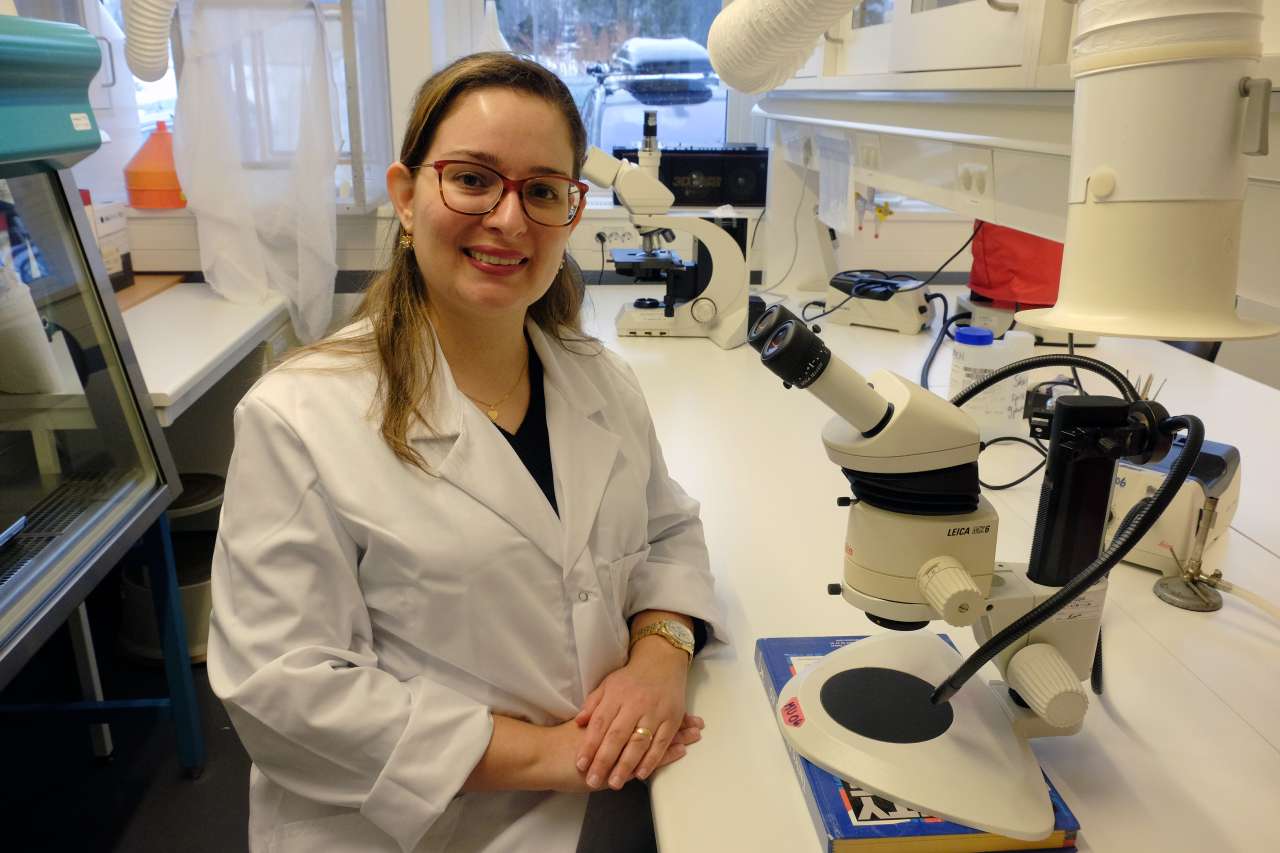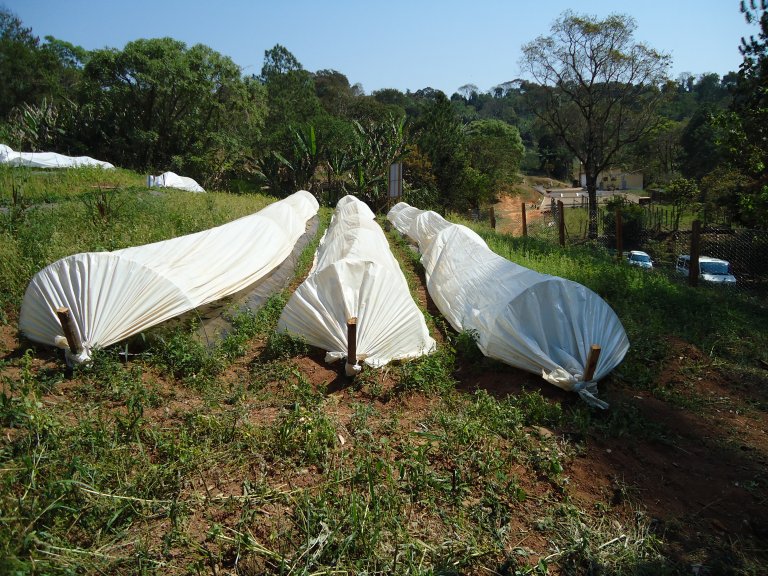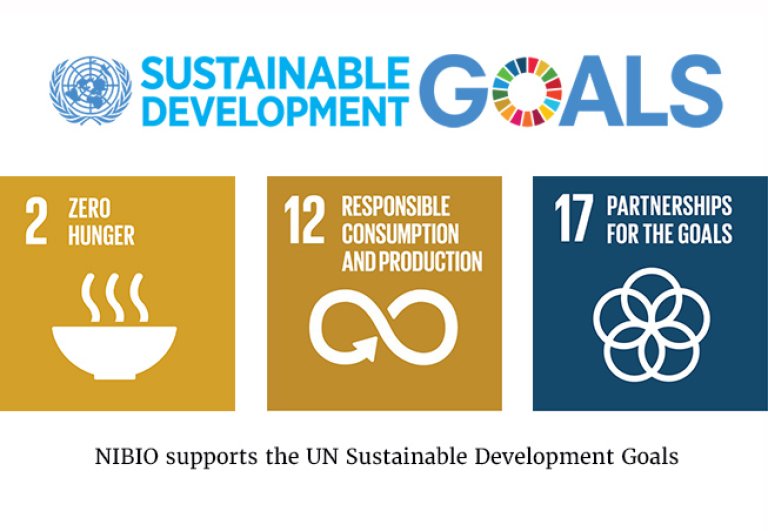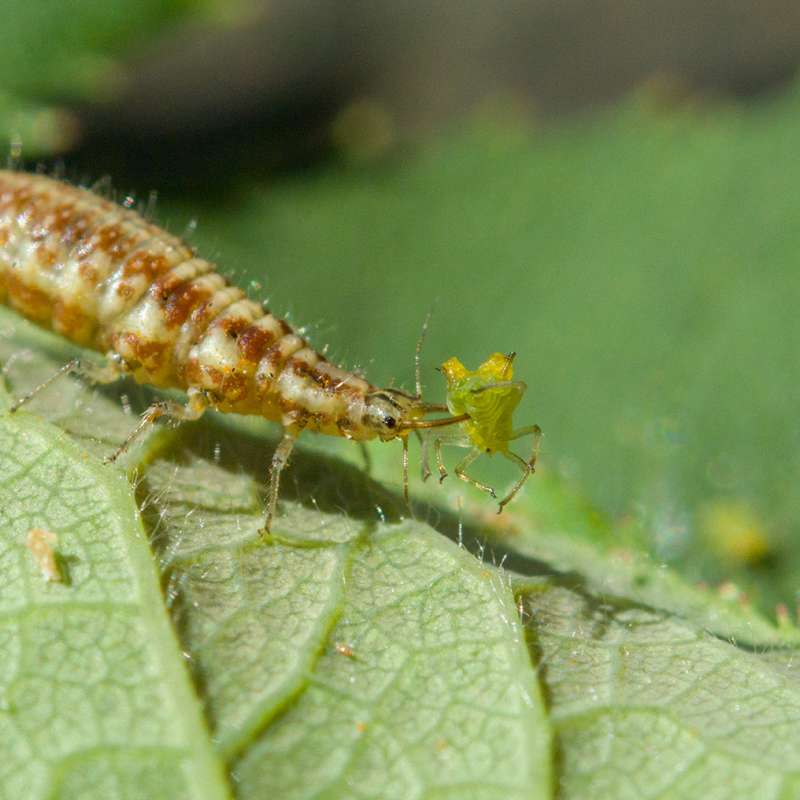Brazilian and Norwegian researchers collaborating on sustainable food production

Ana Beatriz R. Z. Botelho is currently on exchange at NIBIO from Brazil. She is looking at how some insect pathogens establish in plants and protect them against harmful insects – almost like bodyguards. Photo: Siri Elise Dybdal.
Innovative tools, approaches and policy instruments to increase adoption of integrated pest management (IPM) strategies and minimize pesticide use is crucial for sustainable and financially viable food production.
For more than a decade, the Norwegian Institute of Bioeconomy Research (NIBIO) and the agricultural faculty (ESALQ) of São Paulo University (USP) have collaborated on various research projects developing integrated pest management (IPM) tools in different crops as alternatives to chemical pesticides.
Recently the two institutes signed a new Memorandum of Understanding to continue the research collaboration onwards.
ESALQ-USP is Brazil’s most renowned institution within science, technology, and teaching in the field of agriculture.
Growing market for biological pesticide
-Brazil is the world’s fifth largest country. Agriculture is a very important industry and Brazil is a bigger exporter of several agricultural products than many other countries worldwide. As a result, there is a great and innovative agricultural research community in Brazil, with close ties to the agricultural industry, says Ingeborg Klingen, who is head of the Department of Invertebrate Pests and Weeds at NIBIO. She also leads the SMARTCROP project where ESALQ-USP is one of several national and international partners.
Since 2008, Brazil has been the largest global consumer of synthetic pesticides and in some crops pesticides are used intensively. The biological pest control market is estimated at 2% of the total plant protection market in Brazil, but sales are projected to increase and represent 10% of the market in 2020 (MAPA).
-One interesting aspect of the collaboration with ESALQ-USP is that we get insight into the development of sustainable IPM tools that reaches the important and huge agricultural market in Brazil, highlights Klingen.
According to the NIBIO-scientist, it is also a great advantage to collaborate with an institute that has such a high publication frequency, as well as broad international collaboration profile. Master- and PHD-students are often included in projects at the Brazilian institute.
-Through the SMARTCROP project we have had both scientists and many student missions and collaborations focusing on building competence on biological control and IPM in Brazil and Norway. Both parties have benefited greatly from this. Presently we also have a CAPES/SIU project connected to SMARTCROP and led by Prof Italo Delalibera Jr from ESALQ-USP and Dr Richard Meadow from Norwegian University of Life Sciences (NMBU). In connection with the SMARTCROP 3rd Annual Symposium 6 February, a group from ESALQ-USP will attend and interact with scientists and students at NIBIO and NMBU, to build even stronger competence within the field of IPM. Presently there are three professors, one Post Doc and four PhD students from ESALQ-USP that are linked up to NIBIO and NMBU through SMARTCROP/ CAPES/ SIU, says Klingen.

Useful fungus
One Brazillian Post Doc from ESALQ-USP currently on exchange at NIBIO is biologist Ana Beatriz R. Z. Botelho, who has a master and doctorate degree in Entomology from Brazil.
-For the last eight years, I have been looking at fungi that can act as a parasite of insects and kill or seriously injure them. In these fungi, I have been studying fungal diversity, abundance, and phylogeny. More recently, I have been working with bioinformatic tools applied to the genome, says Bothelo.
Her Post Doc project involves looking at how some insect pathogens establish in plants and protect them against harmful insects – almost like bodyguards. Ongoing studies have shown that naturally occurring fungi in the genus Metarhizium has a probiotic effect with great biotechnologically potential, by promoting rapid root growth, antagonizing phytopathogenic fungi and increasing the mortality of important pests of crops such as sugarcane.
Significant questions are for example what mechanisms are applied when the fungus establish in a plant or insect, what does it produce etc.
-In my Post Doc project we decided to investigate which genes are involved in encoding biologically active molecules and genes associated with different lifestyles of one isolate of Metarhizium that probably may be described as a new species, she explains.
-The results of this study may help in providing background information needed to describe this new species of Metarhizium. Such information is required for commercial registration of a fungal species as a biocontrol product. Further, this information will increase the knowledge of the genome of these and other recognized species of Metarhizium, she says.
Botelho emphasizes that it has been an amazing opportunity for her at NIBIO to learn, train and apply the bioinformatic tools to her project.
-And to get in close contact with researchers at a renowned institute like NIBIO. It has also been an excellent experience with a distinct culture, helping me to develop both personal and professional skills, she adds.
Several collaborations
Other areas where NIBIO and the Brazillian institute has collaboration includes innovative IPM tools such as combining odours and natural enemies to combat insect pests, as well as looking at the bedding used for strawberries in Norway and Brazil and how that impacts on the quantity of pests and beneficials.
-ESALQ-USP is very good at alternative pest control including both microbials and predatory mites and we are very much benefiting from their knowledge. Currently we are also building up collaboration within chemical ecology where both ESALQ-USP and NIBIO are skilled, says Klingen.
KONTAKTPERSON


SMARTCROP
- SMARTCROP is an extensive research project where the aim is to find innovative approaches and technologies for Integrated Pest Management (IPM) to increase sustainable food production.
- Norway has implemented EU´s Directive on sustainable use of pesticides (2009/128/EC) which promotes the use of IPM and alternative approaches or techniques (IPM tools) to minimize pesticide use. There is a lack, however, of proven and practical IPM tools for farmers to use, as well as a relevant policy for a successful implementation of IPM. In SMARTCROP the aim is to meet these challenges.
- The project involves a reference group and several national and other international partners from farmers, agricultural extension service and IPM tool companies to regulatory authorities, wholesalers and retailers.

KONTAKTPERSON

Tekst frå www.nibio.no kan brukast med tilvising til opphavskjelda. Bilete på www.nibio.no kan ikkje brukast utan samtykke frå kommunikasjonseininga. NIBIO har ikkje ansvar for innhald på eksterne nettstader som det er lenka til.

